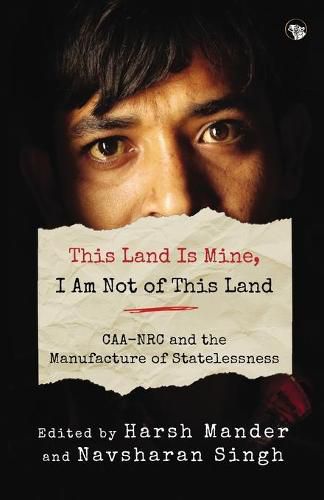Readings Newsletter
Become a Readings Member to make your shopping experience even easier.
Sign in or sign up for free!
You’re not far away from qualifying for FREE standard shipping within Australia
You’ve qualified for FREE standard shipping within Australia
The cart is loading…






This title is printed to order. This book may have been self-published. If so, we cannot guarantee the quality of the content. In the main most books will have gone through the editing process however some may not. We therefore suggest that you be aware of this before ordering this book. If in doubt check either the author or publisher’s details as we are unable to accept any returns unless they are faulty. Please contact us if you have any questions.
Description
The Citizenship Amendment Act (CAA), passed by the Parliament of India
in December 2019, promises citizenship to migrants of the ‘Hindu, Sikh,
Buddhist, Jain, Parsi or Christian community from Afghanistan, Bangladesh or
Pakistan’. By excluding Muslims from the list and not extending the promise
to refugees from any of India’s non-Muslim-majority neighbours, the CAA
makes religion the basis of citizenship for the first time in the history of the
Republic. Many fear that this Act, coupled with a countrywide National
Register of Citizens (NRC), will eventually be used to disenfranchise India’s
Muslims, or to trap them in a permanent state of fear and insecurity, which
has been the fate of millions of Bengali-origin Muslims of Assam.
This Land is Mine, I Am Not of This Land brings together a comprehensive selection
of essays that deal with the theoretical, political and subjective aspects of this
issue. The first section traces the evolution of citizenship in India. The following
section deals with the peculiar case of Assam. Covered here are the bureaucratic
travesties unleashed in the name of protecting the state from ‘external
aggression’ as well as their sobering human cost. The concluding sections expose
the superfluousness of the National Population Register (NPR), and pose serious
questions on the constitutionality of the CAA.
The book argues that with a key value like citizenship in question, it is not
just the destinies of India’s citizens but the very democratic foundation of the
Republic that is at stake.
$9.00 standard shipping within Australia
FREE standard shipping within Australia for orders over $100.00
Express & International shipping calculated at checkout
This title is printed to order. This book may have been self-published. If so, we cannot guarantee the quality of the content. In the main most books will have gone through the editing process however some may not. We therefore suggest that you be aware of this before ordering this book. If in doubt check either the author or publisher’s details as we are unable to accept any returns unless they are faulty. Please contact us if you have any questions.
Description
The Citizenship Amendment Act (CAA), passed by the Parliament of India
in December 2019, promises citizenship to migrants of the ‘Hindu, Sikh,
Buddhist, Jain, Parsi or Christian community from Afghanistan, Bangladesh or
Pakistan’. By excluding Muslims from the list and not extending the promise
to refugees from any of India’s non-Muslim-majority neighbours, the CAA
makes religion the basis of citizenship for the first time in the history of the
Republic. Many fear that this Act, coupled with a countrywide National
Register of Citizens (NRC), will eventually be used to disenfranchise India’s
Muslims, or to trap them in a permanent state of fear and insecurity, which
has been the fate of millions of Bengali-origin Muslims of Assam.
This Land is Mine, I Am Not of This Land brings together a comprehensive selection
of essays that deal with the theoretical, political and subjective aspects of this
issue. The first section traces the evolution of citizenship in India. The following
section deals with the peculiar case of Assam. Covered here are the bureaucratic
travesties unleashed in the name of protecting the state from ‘external
aggression’ as well as their sobering human cost. The concluding sections expose
the superfluousness of the National Population Register (NPR), and pose serious
questions on the constitutionality of the CAA.
The book argues that with a key value like citizenship in question, it is not
just the destinies of India’s citizens but the very democratic foundation of the
Republic that is at stake.